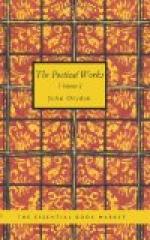Plenteous of grace, descend
from high,
Rich in thy sevenfold energy!
Thou strength of his Almighty hand,
Whose power does heaven and earth command:
Proceeding Spirit, our defence,
Who dost the gifts of tongues dispense,
And crown’st thy gift with eloquence!
Refine and purge our earthly
parts;
But, oh, inflame and fire our hearts!
Our frailties help, our vice control,
Submit the senses to the soul;
And when rebellious they are grown,
Then lay thy hand, and hold them down!
Chase from our minds the infernal
foe,
And peace, the fruit of love, bestow;
And, lest our feet should step astray,
Protect and guide us in the way.
Make us eternal truths receive,
And practise all that we believe:
Give us thyself, that we may see
The Father, and the Son, by thee.
Immortal honour, endless fame,
Attend the Almighty Father’s name
The Saviour Son be glorified,
Who for lost man’s redemption died:
And equal adoration be,
Eternal Paraclete, to thee!
* * * * *
THE HIND AND THE PANTHER.
A POEM, IN THREE PARTS.
—Antiquam exquirite matrem.
Et vera incessa patuit Dea.
VIRG.
* * * * *
PREFACE.
The nation is in too high a ferment for me to expect either fair war, or even so much as fair quarter, from a reader of the opposite party. All men are engaged either on this side or that; and though conscience is the common word, which is given by both, yet if a writer fall among enemies, and cannot give the marks of their conscience, he is knocked down before the reasons of his own are heard. A preface, therefore, which is but a bespeaking of favour, is altogether useless. What I desire the reader should know concerning me, he will find in the body of the poem, if he have but the patience to peruse it. Only this advertisement let him take beforehand, which relates to the merits of the cause. No general characters of parties (call them either Sects or Churches) can be so fully and exactly drawn, as to comprehend all the several members of them; at least all such as are received under that denomination. For example, there are some of the Church by law established, who envy not liberty of conscience to Dissenters, as being well satisfied that, according to their own principles, they ought not to persecute them. Yet these, by reason of their fewness, I could not distinguish from the numbers of the rest, with whom they are embodied in one common name. On the other side, there are many of our sects, and more indeed than I could reasonably have hoped, who have withdrawn themselves from the communion of the Panther, and embraced this gracious indulgence of his Majesty in point of toleration. But neither




